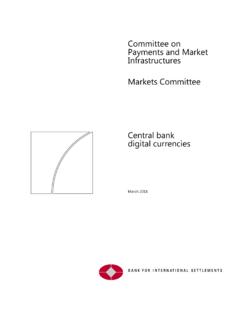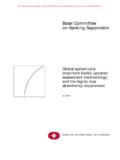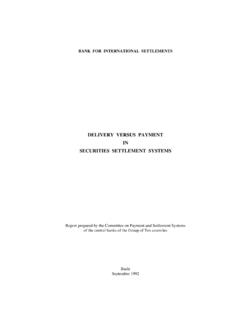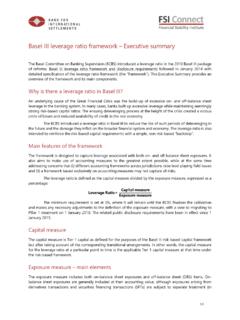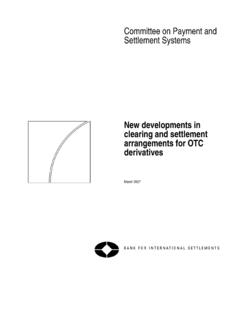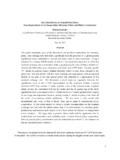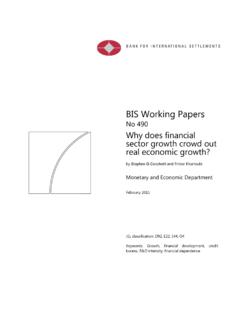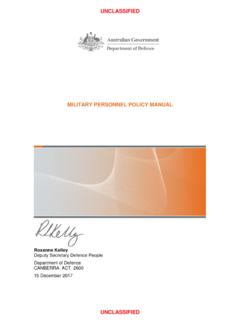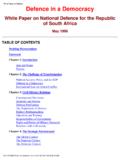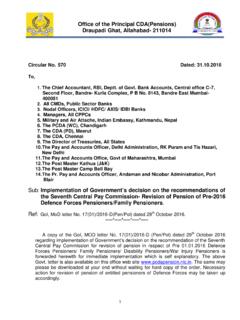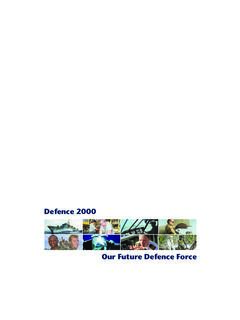Transcription of Basel Committee on Banking Supervision
1 Basel Committee on Banking Supervision Review of the Principles for the Sound Management of Operational Risk 6 October 2014 This publication is available on the BIS website ( ). Bank for International Settlements 2014. All rights reserved. Brief excerpts may be reproduced or translated provided the source is stated. ISBN 92-9131-978-92-9131-554-3 (print) ISBN 92-9197-978-92-9131-556-7 (online) Contents Review of the Principles for the Sound Management of Operational Risk .. 1 1. Executive summary .. 1 Key findings and observations .. 1 Fundamental principles of operational risk management .. 3 Three lines of defence .. 4 Recommendations .. 5 2. Introduction .. 6 3. Findings and observations .. 6 Principle 1: Operational risk culture.
2 6 Principle 2: Operational risk management framework .. 8 Principle 3: Board of directors .. 10 Principle 4: Operational risk appetite and tolerance .. 12 Principle 5: Senior management .. 13 Principle 6: Risk identification and assessment .. 15 Principle 7: Change management .. 25 Principle 8: Monitoring and reporting .. 27 Principle 9: Control and mitigation .. 28 Principle 10: Business resilience and 31 Principle 11: Role of 33 Overarching principle of the three lines of defence .. 34 First line of defence .. 35 Second line of defence .. 36 Third line of defence .. 37 4. Recommendations .. 39 Appendix I Participating jurisdictions .. 43 Appendix II: Guidance for bank questionnaire ratings .. 44 Appendix III: PSMOR principles .. 45 Appendix IV: Emerging and noteworthy practices .. 52 Review of the Principles for the Sound Management of Operational Risk iii Review of the Principles for the Sound Management of Operational Risk 1.
3 Executive summary In June 2011 the Basel Committee on Banking Supervision published its Principles for the Sound Management of Operational Risk 1 ( the Principles ) to provide guidance to banks on the management of operational risk. The eleven principles incorporate the lessons from the financial crisis and the evolution of sound practice for management of operational risk. The Principles cover governance, the risk management environment and the role of disclosure, and address the three lines of defence (business line management, an independent corporate operational risk management function and an independent review). In light of the significant number of recent operational risk-related losses incurred by banks, and consistent with the Committee s greater focus on monitoring the implementation of its standards and guidance, earlier this year the Basel Committee conducted a review of the implementation of its The review involved 60 systemically important banks in 20 jurisdictions and covered all 11 principles with a specific focus on the guidance related to the three lines of defence.
4 The exercise was designed as a questionnaire by which banks self-assessed their implementation of the Principles. While it was conducted under the overall Supervision of the Basel Committee and the respective supervisory authorities, the review did not involve an onsite validation of the banks responses. The objectives of the exercise were to (i) establish the extent to which banks have implemented the Principles, (ii) identify significant gaps in their implementation and (iii) highlight emerging and noteworthy operational risk management practices at banks that are not currently addressed by the Principles. Key findings and observations Overall, banks have made insufficient progress in implementing the Principles originally introduced in 2003 and revised in Many banks are still in the process of implementing various principles.
5 Systemically important banks (SIBs) have implemented the Principles and the operational risk management tools to varying degrees. Historically, implementation of the Principles was strongly aligned with the Basel Framework s approaches to calculating operational risk capital requirements such as The Standardised Approach (TSA) and the Advanced Measurement Approach (AMA). Banks applying these more advanced approaches are expected to have more advanced operational risk management 1 Available at 2 In its November 2012 Progress Report to the G20 Ministers and Governors , the Financial Stability Board (FSB) said that recent events underscored the need for supervisors to increase their focus on operational risk management, particularly for global systemically important financial institutions (see ).
6 In addition, the FSB recommended that the BCBS conduct a peer review on implementation of its Principles by June 2014. 3 Throughout the report, reference is made to varying quantities of bank responses using the words few typically less than10, some typically more than 10 but less than 20 and many typically more than 20. Review of the Principles for the Sound Management of Operational Risk 1 frameworks and implement to a greater degree the operational risk management tools, which include risk and control self-assessments (RCSAs), internal loss data collection, scenario analysis, external data collection and analysis, key risk indicators (KRIs)/key performance indicators (KPIs), change management and comparative analysis. Some SIBs, however, have yet to implement all of the Principles and do not deploy the full range of operational risk management tools.
7 This may be because some of the banks are not subject to the most advanced approaches to operational risk and the associated higher expectations for managing the risk. Therefore, these banks may not be adequately identifying and managing their operational risk exposures. Methods for identifying and managing operational risk should be seen as complementary to the calculation of operational risk capital requirements, rather than as a consequence of that activity. Aligning the implementation of the risk management principles with the risk profile and systemic importance of banks, rather than the approaches selected to calculate operational risk capital requirements, is also be consistent with the objective of more intensive and effective Supervision of systemically important banks.
8 The following chart summarises the average bank ratings4,5 for each of the Principles and the three lines of defence. This review has identified various challenges and themes within each of the principles. Four principles have been identified as among the least thoroughly implemented by banks including (i) operational risk identification and assessment, (ii) change management, (iii) operational risk appetite and tolerance, and (iv) disclosure. In addition, weaknesses have been observed in the implementation of the 4 Rating: 1 Not implemented; 2 Materially not complied with; 3 Largely complied with; 4 Fully complied with; N/A Not applicable. 5 Average rating calculated using arithmetic average of ratings 1 4. Where banks rated the practice as n/a, a 0 rating was assigned.
9 2 Review of the Principles for the Sound Management of Operational Risk overarching principle of the three lines of defence. The following section summarises the challenges and themes related to these principles. Fundamental principles of operational risk management Operational risk identification and assessment (Principle 6) Overall, while banks have implemented some of the operational risk identification and assessment tools, others are not fully implemented or are not being effectively used for risk management purposes. Some banks indicated that the tools that had been implemented were largely used for risk measurement purposes (ie capital measurement and allocation), while others indicated that tools had not been fully implemented because they were not deemed necessary for risk measurement purposes.
10 In addition, a wide range of practice was reported regarding the implementation of many of these tools. For instance, while many banks have implemented distinct, multi-tiered operational risk management tools (ie RCSAs, scenario analysis, business process mapping), other banks noted that they have chosen to implement one tool that would serve the purpose of two or possibly three tools together (ie a scenario-based RCSA, a process-based RCSA etc). Furthermore, at some banks, considerable management effort will be required to ensure the bank-wide implementation of certain tools. These include key risk and performance indicators; external data collection and analysis; and comparative analysis as well as the creation and monitoring of action plans generated through the use of the operational risk management tools.
